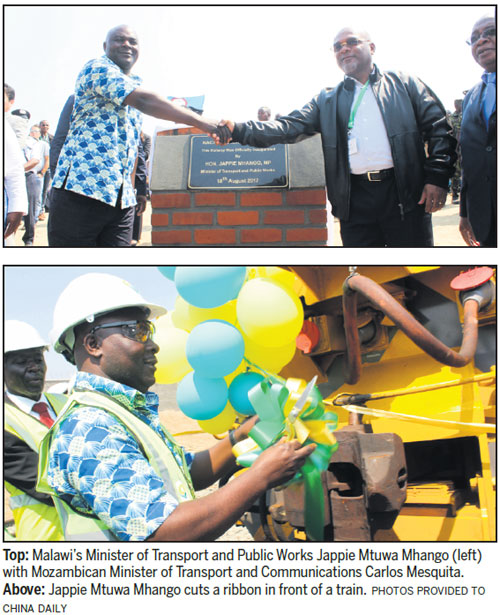Malawi celebrates milestone with launch of rail link
Malawi marked an important milestone in its transportation sector recently when it inaugurated the Malawi section of the Nacala Corridor railway line, which stretches from Moatize in western Mozambique to the Indian Ocean port of Nacala to the east.
Jappie Mtuwa Mhango, Malawi's minister of transportation and public works, officially launched the US$4.9 billion railway line section, which was financed by Vale Logistics of Brazil.
The purpose of constructing the railway section is to accommodate the passage of coal from Moatize in Mozambique, passing through Malawi to the port of Nacala-a-Velha in Mozambique.

The agreement for construction of the new railway was signed by the government of Malawi and Vale Logistics in 2011 through a 30-year public-private partnership arrangement, the minister says.
Through this infrastructure, on the import side, the Nacala Corridor will enhance the transportation of fertilizer, diesel, grain and general containerized cargo, with an average of 350,000 tons per year.
On the export side, the corridor will facilitate the movement of a total of 100,000 tons on average of Malawian sugar, pigeon peas, tobacco and tea, with the capacity to increase this number threefold, says Renato Torres, chairman of Nacala Corridor Logistics Cos.
The corridor will serve the southern African region, particularly Malawi, Mozambique, Zambia and the Democratic Republic of the Congo, linking these countries to the natural deep-water port in Nacala.
The development comes as the China-led Belt and Road Initiative gains momentum.
China's ambassador to Malawi welcomed the development and encouraged Africa to emulate the example of the Belt and Road Initiative.
The essence of Belt and Road includes cooperation, common development, mutual benefits, openness and sharing, says the ambassador, Wang Shiting.
Africa is a historically important component of the ancient Silk Road and is still an indispensable part today, the ambassador says.
"Africa is in desperate need of development and, of course, the development of the continent cannot be realized without assistance from the international community," Wang says.
"The core of the Belt and Road Initiative is focusing on common development. We hope that African countries can get investment, trade, infrastructure and industrialization, which are key to their development through their active participation in the initiative."
Wang says he believes Africa will benefit a lot in poverty reduction, development and regional integration through participation.
"On the other hand, the active participation of Africa in the Belt and Road Initiative will also strengthen its connection with the international community, especially its connectivity with Asian and European countries," Wang says.
The railway network in Malawi is 797 kilometers long. Of this, 101 km between Nkaya and Nayuchi is being upgraded by the private sector as part of the route from the coal mines at Moatize to Nacala.
The remainder of the rail line, from Mchinji through Salima in central Malawi to Marka on the border with Mozambique in southern Malawi, is in poor condition, with 80 km of track that is unusable because of bridge and track washouts following natural disasters.
Locomotive equipment and rolling stock are old and unreliable. Construction of the new link from Nkaya to the coal mines at Moatize began in 2012 to provide mainly for coal transportation on the corridor to Nacala.
MORE FROM China SCIO
- China-built railway gives new lease of life to East Coast of Peninsula Malaysia>
- Bangladeshi, Chinese firms sign joint venture pacts to build railway>
- Chinese companies gearing up as construction of China-Laos railway in full swing>
- Inauguration of Baku-Tbilisi-Kars Railway represents key link in modern Silk Road>
- China, Malaysia to jointly groom railway expertise>